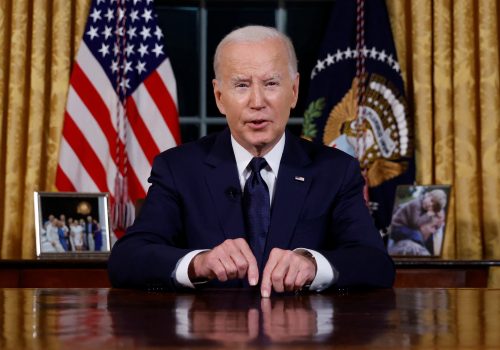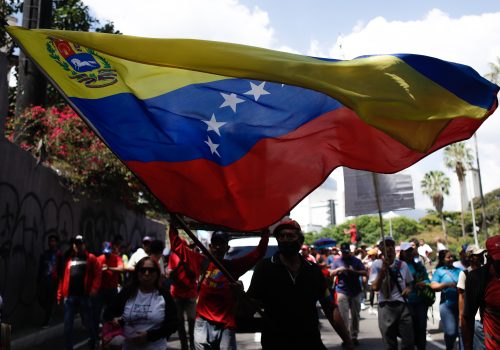Biden’s inflection point and history’s sobering lessons
Historians may come to know US President Joe Biden’s speech to the nation this week as his “Inflection Point Address,” and it was as eloquent and compelling as any he has delivered in his lifetime.
It has the potential to be the most significant of his presidency, and it was choreographed to be seen as such. It was only the second time he has chosen to speak from behind the Resolute Desk in the Oval Office, and he did it with the backdrop of wars in Ukraine and Israel and simmering tensions around Taiwan.
Beyond that, the eighty-year-old commander in chief, who had been in Israel just a day earlier, looked sharp and spoke with the vigor of a man who understands the historic moment and his role in it. He connected the dots between Russia’s criminal war in Ukraine and Hamas’s terrorist attack on Israel, assisted by Iran.
“We’re facing an inflection point in history,” he said, “one of those moments where the decisions we make today are going to determine the future for decades to come.”
He was also clear about what connects the two, seemingly disparate conflicts. “Hamas and Putin represent different threats, but they share this in common,” he said. “They both want to completely annihilate a neighboring democracy—completely annihilate it.”
Importantly, European Commission President Ursula von der Leyen was sending much the same message earlier the same evening, speaking in Washington at the Hudson Institute. She argued that Russia and Hamas, supported by Iran, want to “wipe from the map” both Ukraine and Israel, and that free countries could not allow that.
“Our democracies are under sustained and systemic attack by those who abhor freedom because it threatens their rule,” said von der Leyen. “For more than six hundred days, our friends in Ukraine have been fighting and dying for their freedom against Russian aggression. And now Israel has suffered the worst terrorist attack in its history, and the worst mass murder of Jews since the Holocaust. These two crises, however different, call on Europe and America to take a stand—and to stand together.”
As if scripted by a grand dramatist, Chinese leader Xi Jinping and Russian President Vladimir Putin were meeting in China as Biden traveled to Israel, doubling down on their common cause to rewrite the rules of the global order.
Xi leveraged a gathering of representatives from nearly 150 developing countries, the Belt and Road Forum, to put forward China’s vision as an alternative to US leadership. “What we stand against are unilateral sanctions, economic coercion and decoupling and supply chain disruption,” he said, in advancing what he called a “fairer, multipolar world.”
Xi feted Putin as his guest of honor, meeting with him for three hours on Wednesday and making sure to be photographed frequently by his side. The two leaders neither condemned Hamas nor mourned Israeli losses.
Putin also connected the wars in Ukraine and Israel, saying that he had discussed both “in detail” with Xi. “All these external factors are common threats,” Putin said, “and they strengthen Russian-Chinese relations.”
At the same time that Putin was in Beijing, Russian Foreign Minister Sergey Lavrov was in North Korea, hailing the “qualitatively new, strategic level of relations.” That builds on North Korean leader Kim Jong Un’s recent visit to see Putin at the Vostochny Cosmodrome, followed by the delivery of more than a thousand containers of military equipment and arms to support Russia’s war in Ukraine.
Add Iran to the mix, and you have a toxic brew of autocrats. As Biden told Americans this week, “Iran is supporting Russia in Ukraine, and it’s supporting Hamas and other terrorist groups in the region. And we’ll continue to hold them accountable.”
Now that Biden has identified this inflection point and its actors, it’s worth reflecting on what the term means—and what it demands from the United States and its global partners.
What inflection points have in common is that they are plastic moments in history where individuals and groups of leaders can have outsize influence in shaping the future, for good or ill.
I consider Biden’s inflection point to be the fourth since the early twentieth century. The previous ones set the stage for the periods after both world wars (1918-1945 and 1945-1990), the period after the Cold War (1990-2022), and now the period beginning with Russia’s war in Ukraine.
As was the case previously, expect this defining “moment” in history to open up an era that could stretch for three decades or more, perhaps until 2050.
It’s clear that the period after World War I was marked by failures, including the badly constructed Versailles Treaty ending the war and the ill-fated League of Nations that was meant to bring the world together to prevent future wars. What the world ended up with instead was the rise of fascism, the emergence of Hitler’s Third Reich, and then the Holocaust and World War II, leaving more than seventy million dead.
The period after World War II was a success, in no small part due to what leaders then had learned from their mistakes. The United States replaced its misguided isolationism with purposeful internationalism. Washington worked with European partners and others to construct what we now know as the international liberal order of rules and institutions, including the United Nations, the Bretton Woods institutions, NATO, and the European Coal and Steel Community.
The third inflection point ushered in the post-Cold War period, which proved not to be the “end of history,” a term that Francis Fukuyama coined. He argued that Western liberal democracy’s ascendency after Soviet collapse marked “the universalization of Western liberal democracy as the final form of human government.”
What’s true is that NATO and the European Union both expanded democracy’s realm, joined by previously Soviet bloc countries that embraced pluralism and free markets. What the West didn’t anticipate was the staying power of autocratic China and its ruling Communist Party, despite globalization and economic growth, and the emergence of a revanchist Russia.
After the 9/11 terrorist attacks on the United States, NATO countries rallied around Washington with their Article 5 commitment to common defense. However, the long wars that followed in Afghanistan and Iraq failed to seize upon that galvanizing opportunity.
I launched this column and newsletter in 2018 under the title of Inflection Points, sensing that we were at one of those defining moments in history when US leadership alongside partners and allies would be decisive. My introduction to that term was as early as 2012, when the National Intelligence Council employed it in “Global Trends 2030.”
That report offered up four potential worlds, including one where the risk of interstate conflict increases and the United States retrenches and another, at the other extreme, involving “a newly rebalanced and fused world in which social, economic, technological and political progress is widespread.” The two other scenarios were a “Gini-Out-of-the-Bottle” world—one in which inequalities within states and between states dominate, and another, nonstate world in which nonstate actors, from multilateral corporations to terrorists, flourish both for good and bad.
“None of these outcomes is inevitable,” wrote Mathew Burrows, the author of the report. “The future world order will be shaped by human agency as much as unfolding trends and unanticipated events.”
Biden will find that identifying this period as an inflection point is easier than shaping the future. But his speech this past week is a good start, including its focus on our divisions at home. “We can’t let petty, partisan, angry politics get in the way of our responsibilities as a great nation,” the president declared. The other point that Biden made, true across all four inflection points, is that the costs of action are far less than those of inaction. “History has taught us that when terrorists don’t pay a price for their terror, when dictators don’t pay a price for their aggression, they cause more chaos and death and more destruction. They keep going, and the cost and the threats to America and to the world keep rising.”
In short, pay now or pay more later.
Perhaps Biden should have added: History’s sobering lesson about inflection points is that working together with partners and allies through constructive engagement can change the world for the better, as shown through the peaceful end of the Cold War. However, the costs of getting it wrong also escalate, where the price of miscalculation and isolationism in the 1930s resulted in world war.
Frederick Kempe is president and chief executive officer of the Atlantic Council. You can follow him on Twitter @FredKempe.
THE WEEK’S TOP READS
Read Biden’s speech to see how he connected the dots between the crises in Israel and Ukraine. Harkening back to the internationalist rhetoric of presidents Franklin D. Roosevelt, John F. Kennedy, and Ronald Reagan, Biden makes the case for American unity and leadership as the global order reaches an inflection point.
“American leadership is what holds the world together. American alliances are what keep us, America, safe. American values are what make us a partner that other nations want to work with. To put all that at risk if we walk away from Ukraine, if we turn our backs on Israel, it’s just not worth it,” Biden said. “That’s why, tomorrow, I’m going to send to Congress an urgent budget request to fund America’s national security needs, to support our critical partners, including Israel and Ukraine.”
As his speech came to an end, Biden issued a plea for unity: “Tonight, there are innocent people all over the world who hope because of us, who believe in a better life because of us, who are desperate not be forgotten by us, and who are waiting for us. But time is of the essence. I know we have our divisions at home. We have to get past them. We can’t let petty, partisan, angry politics get in the way of our responsibilities as a great nation.” Read more →
#2 A World Without American Deterrence
Walter Russell Mead | WALL STREET JOURNAL
In this important piece, Walter Russell Mead makes the case against “strategic passivity,” arguing that declining US “power to deter” encourages actors to challenge American power across the world.
“Mr. Biden has yet to grapple with the painful truth that America’s core problem in the Middle East is the march of an unappeasable Iran toward regional power regardless of moral or human cost,” Mead writes. “That is not the only thing Mr. Biden and his team don’t seem to have grasped. The Middle East firestorm is merely one hot spot in a world spinning out of control.”
Pointing to Russia’s invasion of Ukraine, Iran’s support for Hamas, and China’s increasing aggression in the South China Sea, Mead comes to the powerful conclusion that “if President Biden’s response to Hamas and its patron Iran fails to restore respect for American power, wisdom and will, our enemies everywhere will draw conclusions and take steps that we and our allies won’t like.” Read more →
#3 The Week When Biden Hugged Bibi
Susan B. Glasser | THE NEW YORKER
In the New Yorker, Susan Glasser dissects Biden’s busy week—from his wartime visit to Israel to his primetime address on Thursday night. She accurately characterized Biden’s speech as “a lecture from a family patriarch to a fractious brood that didn’t necessarily want to hear it: Grow up. The world is counting on us.”
“For years, Biden has warned about the current geopolitical moment as a brewing conflict between the democracies of the world and rising autocracies, such as Russia and China, calling this an ‘inflection point’ in apocalyptic language that suggests a new global conflict like the two World Wars of the twentieth century,” Glasser writes. “In the past, it might have been possible to dismiss some of that as hyperbole from a politician who grew up in the immediate aftermath of the Second World War. But events of the past year and a half—and especially during this trying past couple of weeks—have reinforced the urgency of Biden’s most consistent foreign-policy message.” Read more →
#4 Yes, the U.S. Can Afford to Help Its Allies
David Frum | THE ATLANTIC
After Biden’s budget request for Ukraine and Israel, David Frum preemptively addresses sticker shock and the coming debate about “whether the United States is doing too much.” Read this thoughtful piece to understand exactly what it takes to support allies and why the United States can’t afford not to.
“Thanks to its remarkable rebound from the coronavirus pandemic, the American economy will this year produce $27 trillion in goods and services,” Frum writes. “In the fiscal year that ended on September 30, the U.S. spent about $850 billion of that $27 trillion on national defense. That rounds out at a little more than 3 percent of GDP. That’s only about half of the burden of defense spending that the U.S. shouldered during the final decade of the Cold War.”
Frum argues that costs must be measured against benefits: “The money to Ukraine is buying a powerful reinforcement of peace in Europe and across the world. The money to Israel will buy a similar deterrent to rogue aggression in the Middle East.” Read more →
#5 America’s Middle East Imperative: Contain Iran
Reuel Marc Gerecht and Ray Takeyh | WALL STREET JOURNAL
This deep dive into Iran’s involvement in Hamas’s attack on Israel is a must-read for anyone hoping to understand the rising tensions throughout the Middle East and the role of the United States.
“The fact is that both Iran and Hamas wanted to abort a regional alignment that threatened to integrate Israel more into the Middle East,” Gerecht and Takeyh write. “American and Israeli diplomacy operated on the hubristic assumption that Iran didn’t have veto rights on this process. And regardless of Israeli-Saudi-U.S. diplomatic initiatives, the clerical regime and Hamas take pleasure in watching Israelis die.”
Gerecht and Takeyh argue that while “the shadow of the wars in Iraq and Afghanistan hang uneasily over Washington,” the events of this week “ought to make it unmistakably clear that the U.S. cannot leave the Middle East and pivot to more promising pastures. The region has a way of dragging reluctant powers back into its morass.” Read more →
Atlantic Council top reads
Image: U.S. President Joe Biden delivers a prime-time address to the nation about his approaches to the conflict between Israel and Hamas, humanitarian assistance in Gaza and continued support for Ukraine in their war with Russia, from the Oval Office of the White House in Washington, U.S. October 19, 2023. REUTERS/Jonathan Ernst/Pool


